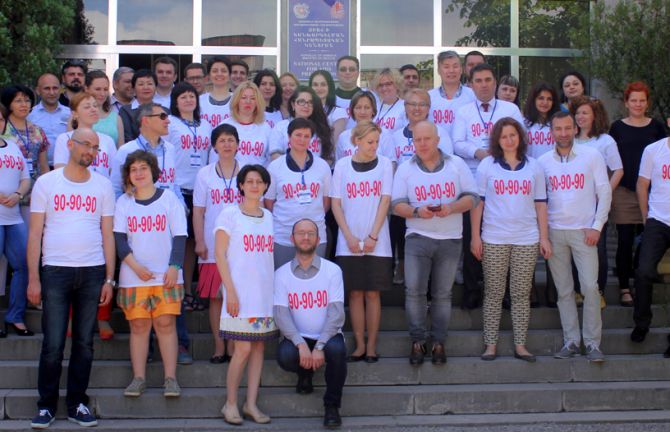


Update
Scaling up access to HIV testing and counselling in eastern Europe and central Asia
03 June 2015
03 June 2015 03 June 2015A regional consultation on scaling up access to HIV testing and counselling in eastern Europe and central Asia was held from 20 to 22 May in Yerevan, Armenia.
More than 50 participants from across the region, including community leaders, policy-makers, technical experts and representatives of UNAIDS Cosponsors discussed ways in which HIV testing could be expanded and better linked to treatment. They made legal and policy recommendations in a joint appeal to governments that focused on simplifying and diversifying HIV services.
The participants highlighted that community-based approaches, such as rapid, mobile and home-based HIV testing, provide an opportunity to reach people and places that were not previously covered by services. Community-based models can contribute to the elimination of logistical and social barriers for key populations to access HIV testing and antiretroviral therapy. Moreover, such models allow detection of HIV infection at earlier stages than in health-care facilities. The sooner treatment starts after diagnosis, the better the outcome.
According to UNAIDS estimates, in 2013 there were 1.1 million people living with HIV in eastern Europe and central Asia and 110 000 new HIV infections. The epidemic in the region is still concentrated in higher-risk populations.
Quotes
“There is an urgent need for simplified, acceptable and innovative HIV testing in eastern Europe and central Asia. This is one of the more important prerequisites for increasing the number of people who know their HIV status, start treatment early and have access to a whole range of support services beyond antiretroviral therapy.”
“We welcome the initiative to conduct such a broad dialogue involving civil society and governments. As we see in the Ukraine example, we lose around 50% of HIV-positive clients between rapid testing and the official diagnosis at a medical facility. Our main purpose in this field is not only to test but to provide a strong linkage to treatment and care.”
“HIV testing is not the main goal but the entry point to the provision of treatment. We need to create an indicator of testing effectiveness which links to treatment: not the number of positive results, but the number of people who are aware of their CD4 level and who are getting treatment, if recommended.”
“It is very important that HIV rapid testing is conducted with the involvement of communities of people living with HIV and with governmental financing.”



